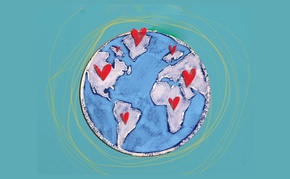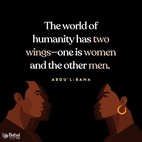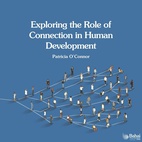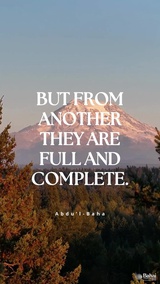The views expressed in our content reflect individual perspectives and do not represent the authoritative views of the Baha'i Faith.
Less than two hundred years ago, the Baha’i Faith brought a new set of teachings that would not only drastically affect individual lives, but set a precedent for the total reorganization of human society.
Since the Baha’i Faith’s beginnings in the mid-19th century, the global Baha’i community has been earnestly transforming these teachings into action in our individual lives, families, and communities. With that development of a framework for spiritual and social transformation, we have seen the fruits of what these teachings offer – the beginnings of a society defined by justice, love, peace, and unity. One subject, however, has remained perplexingly vague since the early years of the Faith: What would a global economy grounded in spiritual values look like?
This same question first arose for me during my college years studying economics. It seemed that everywhere in the world, the economic order was not working for the majority of our human family, and many were in a dire and untenable state. Yet inside the classroom, the conversation could not have been more detached from the current global situation where a deeply human issue had been reduced to a simplified and methodical science. Where economic models and formulas couldn’t answer my question of how we can reform an unsustainable system, I began to turn to my Faith for a new perspective. What I found was far from what I had learned to expect in the classroom – instead, it was based on spiritual principles and bound to individual action.
RELATED: How Much Do We Really Need to Feel Wealthy?
Several Baha’i teachings bear directly on this important question, chiefly the principle of a spiritual solution to the world’s economic problems, which Abdu’l-Baha briefly outlined in an address he gave in Boston, Massachusetts in July of 1912. He explained that:
The fundamentals of the whole economic condition are divine in nature and are associated with the world of the heart and spirit. This is fully explained in the Baha’i teaching, and without knowledge of its principles no improvement in the economic state can be realized. The Baha’is will bring about this improvement and betterment but not through sedition and appeal to physical force — not through warfare, but welfare. Hearts must be so cemented together, love must become so dominant that the rich shall most willingly extend assistance to the poor and take steps to establish these economic adjustments permanently … Strive, therefore, to create love in the hearts in order that they may become glowing and radiant … When the love of God is established, everything else will be realized. This is the true foundation of all economics.
Subsequently, the Universal House of Justice, the democratically-elected leadership body of the Baha’i Faith, has written: “any enduring change for the better in [humanity’s] material affairs requires a change in its spiritual condition.”
A 1931 letter written on his behalf from Shoghi Effendi, the Guardian of the Baha’i Faith, said:
The primary consideration is the spirit that has to permeate our economic life and this will gradually crystallize itself into definite institutions and principles that would help to bring about the ideal conditions foretold by Baha’u’llah.
As a result, over the past quarter-century Baha’is have developed programs for spiritual transformation and social change that have grown and multiplied in villages, towns, and cities around the world. By March of 2017, some of these programs had grown and advanced to a point that could allow for the kind of gradual crystallization of the local area’s economic institutions. For the first time, The Universal House of Justice opened the gate to exploration of models for economic justice and patterns of spiritually-inspired economic behavior in those communities. Their letter announcing this new frontier of Baha’i activity said:
The community-building process … is creating everywhere the ideal environment in which to accrue knowledge and experience, gradually but consistently, about the higher purpose of economic activity … may this exploration become a more pronounced feature of community life, institutional thought, and individual action in the years ahead.
This letter advises Baha’is about how to lay a new foundation for building a new world economy. It won’t be the result of theorizing and postulating, but rather through first advancing spiritual transformation and grassroots community building, and then turning our attention to individual economy-building activities.
Before we can change our economy, then, we must change the way we think and the way we relate to one another – creating a vision of an economy based on spiritual values, rooted in selfless service to humanity, and grounded in our communities and our mutual relationships. In other words:
The aim is to learn about how to participate in the material affairs of society in a way that is consistent with the divine precepts and how, in practical terms, collective prosperity can be advanced through justice and generosity, collaboration and mutual assistance.
This message reached the world’s Baha’is at a particularly potent period in time; everywhere in the world the shortcomings and self-destructive patterns of global capitalism have never been so clear, while those who recognize this still struggle to articulate an alternative. Furthermore, our political systems continue to embed capitalism from the top-down and are staunchly opposed to a change in the status quo. It’s up to all of us to create the solution from the ground up, and the Universal House of Justice prescribed that exact path of action:
“Particularly … where the community-building process is beginning to embrace large numbers, the exhortations contained in the Bahá’í Writings should increasingly inform economic relationships within families, neighbourhoods, and peoples. Not content with whatever values prevail in the existing order that surrounds them, the friends everywhere should consider the application of the teachings to their lives and, using the opportunities their circumstances offer them, make their own individual and collective contributions to economic justice and social progress wherever they reside. Such efforts will add to a growing storehouse of knowledge in this regard.” – Universal House of Justice, 1 March 2017, p. 2.
RELATED: My Brother’s Keeper: 9 Economic Tips for Uniting Humanity
As with all approaches to the world’s problems that Baha’is have advanced, efforts must be grassroots and community-based, and progress through individual action must lead to collective knowledge building. This proposes a radical, hopeful alternative to the deep-seated belief that we are powerless in the face of an economy that favors competition and exploitation over cooperation and service. It suggests that we have collective power to transform our economic reality, and that our economy is an ever-evolving product of our actions and decisions. Thus on the individual level, The Universal House of Justice pointed out, the challenge involves making our daily economic decisions in consort and conjunction with our spiritual ideals:
“Every choice a Bahá’í makes—as employee or employer, producer or consumer, borrower or lender, benefactor or beneficiary—leaves a trace, and the moral duty to lead a coherent life demands that one’s economic decisions be in accordance with lofty ideals, that the purity of one’s aims be matched by the purity of one’s actions to fulfil those aims.” – Universal House of Justice, 1 March 2017, p. 2.
That being so, Baha’is around the world have been rethinking the actions we take in relation to the economy, and asking: How do my decisions affect my local community – and the planet? How can I better serve others through my work and use of resources?
While these questions may seem far-reaching, many Baha’is are already putting them into action. Previous articles here at BahaiTeachings.org have described how some Baha’is choose to bank with socially conscious institutions, buy locally and sustainably, or empower their employees by incorporating them into ownership and decision-making structures. These represent just some possible solutions to the difficult and pressing questions we must ask ourselves.
This new BahaiTeachings.org series will explore how Baha’is seek to answer these questions by finding new and innovative ways to apply spiritual principles to their economic lives in the way they work, spend, and invest. These personal stories can provide us with hope and inspiration for our own lives, and add to a growing library of knowledge that evolves a vision of a better economy for all people. If you have an interest in telling your personal story about how you apply spiritual principles to your economic life, please contact Katia Arami.

















Comments
Sign in or create an account
Continue with Googleor